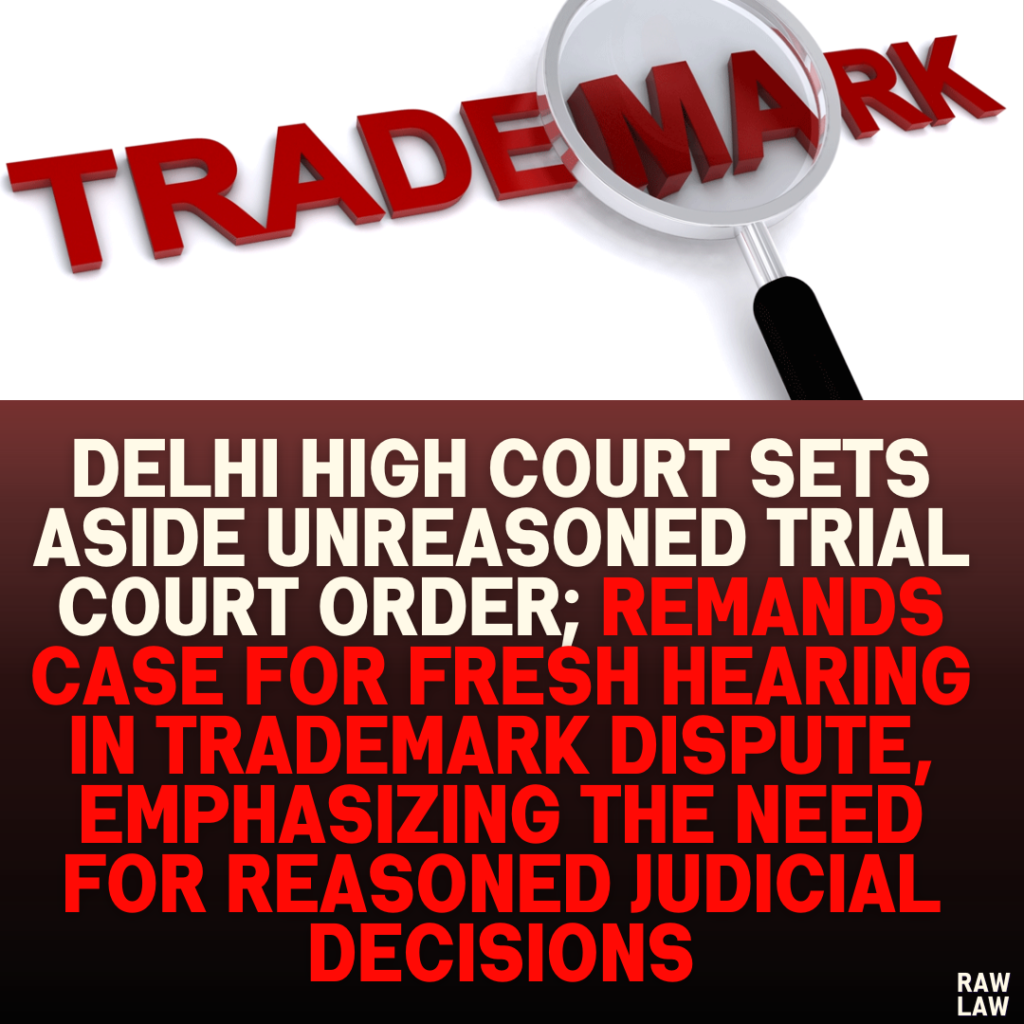Court’s Decision:
The Delhi High Court quashed the Trial Court’s unreasoned order dated December 13, 2024, and directed the transfer of the case to another Commercial Court within the Central District. The new court was tasked to reconsider the applications under Order XXXIX Rules 1 and 2 and the application under Order XXXIX Rule 4 of the Code of Civil Procedure, uninfluenced by prior observations. The High Court set a timeline of three weeks from the first hearing for the new court to decide the applications and waived the costs imposed on the appellants for the delayed filing of their written statement.
Facts:
- Nature of Dispute: The dispute revolves around the use of the trademark ‘Aishwarya/Aiswarya’ by the appellants for their products. The respondents had previously obtained an ad-interim ex-parte injunction against the appellants, restraining them from selling, marketing, or using the mark.
- Orders Under Challenge:
- Ad-interim Injunction (September 20, 2024): The Trial Court restrained the appellants from using the trademark.
- Dismissal of Application to Vacate Injunction (December 13, 2024): The Trial Court dismissed the appellants’ application under Order XXXIX Rule 4 of the CPC, which sought to vacate the ex-parte injunction.
- Impact on Appellants: The appellants argued that these orders significantly harmed their business operations.
Issues:
- Whether the Trial Court’s orders were unreasoned and warranted reconsideration.
- Whether the ex-parte injunction was justified under the circumstances.
- Whether the costs imposed for the delayed filing of the appellants’ written statement should be waived.
Petitioner’s (Appellants’) Arguments:
- Lack of Reasoning: The appellants contended that the Trial Court’s order lacked sufficient reasoning, violating the principles of natural justice.
- Request for Waiver of Costs: They argued that the eight-day delay in filing their written statement was due to logistical issues arising from their non-Delhi location, making the costs imposed unjustified.
- Adverse Business Impact: They emphasized that the injunction restrained them from carrying out regular business activities.
Respondent’s Arguments:
- Acknowledgment of Flaws: The respondents admitted that the Trial Court’s order dated December 13, 2024, lacked proper reasoning.
- Proposal for Remand: They suggested that the matter be remanded to the Trial Court for fresh adjudication of the applications under Order XXXIX Rules 1, 2, and 4 of the CPC.
Analysis of the Law:
- Reasoned Orders:
- Judicial orders, particularly in commercial disputes, must be reasoned to ensure fairness and transparency.
- An absence of reasoning compromises the rights of litigants and the integrity of the judicial process.
- Ad-interim Injunctions:
- Courts are expected to carefully balance the interests of the parties when granting or refusing injunctions.
- An unreasoned order in such cases can tilt the balance unfairly, necessitating intervention by higher courts.
- Procedural Fairness:
- The waiver of costs imposed for minor procedural delays reflects the court’s discretion in ensuring justice is not undermined by rigid adherence to timelines, especially when justified reasons are provided.
Precedent Analysis:
Although the judgment does not cite specific precedents, it aligns with the following principles established in prior judgments:
- Orders must be reasoned to uphold judicial accountability.
- Injunctions should be granted only after a careful analysis of merits and balance of convenience.
Court’s Reasoning:
- Unreasoned Order:
- The court agreed with the respondents’ acknowledgment that the Trial Court’s order lacked sufficient reasoning.
- It noted that a reasoned order is crucial to ensure fairness and protect the rights of both parties.
- Transfer of Case:
- To maintain impartiality and ensure fresh consideration, the High Court directed the Principal District and Sessions Judge to transfer the case to another Commercial Court within the same district.
- Timely Resolution:
- The court imposed a deadline of three weeks from the first hearing for the new court to decide the applications afresh.
- Waiver of Costs:
- Considering the appellants’ non-Delhi location and the minor nature of the delay, the court waived the costs imposed for the late filing of their written statement.
Conclusion:
- The order dated December 13, 2024, was set aside due to lack of reasoning.
- The matter was remanded to a different Commercial Court for fresh consideration.
- The transferee judge was directed to decide the matter uninfluenced by prior observations within three weeks.
- The costs imposed on the appellants for the late filing of their written statement were waived.
Implications:
- Judicial Accountability: The decision reinforces the importance of reasoned orders in commercial disputes to uphold procedural fairness.
- Fresh Adjudication: The directive to reconsider the matter ensures a balanced and unbiased evaluation of the parties’ claims.
- Efficiency in Justice: The court’s imposition of a strict timeline for resolution highlights its commitment to expeditious justice delivery.
This judgment underscores the judiciary’s role in ensuring that procedural lapses do not compromise substantive justice, especially in commercial litigation involving trademarks.




Pingback: Supreme Court Remands Andhra Pradesh Assigned Lands Case: Sets Aside High Court Judgment Over Misconception Regarding Non-Alienability Under Revised Assignment Policy of 1958 and AP Assigned Lands (Prohibition of Transfer) Act, 1977 - Raw Law